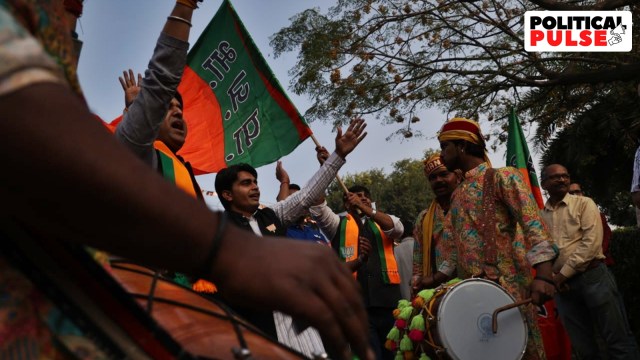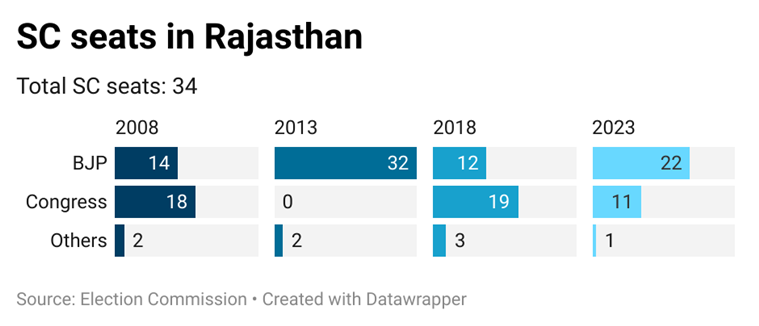© The Indian Express Pvt Ltd
Latest Comment
Post Comment
Read Comments
 BJP workers celebrate the party's win in Chhattisgarh, Rajasthan and Madhya Pradesh elections (Express Photo by Praveen Khanna)
BJP workers celebrate the party's win in Chhattisgarh, Rajasthan and Madhya Pradesh elections (Express Photo by Praveen Khanna)Like in the case of tribal seats, the constituencies reserved for Scheduled Castes also saw a swing in favour of the BJP in the recent state polls. Of the 98 SC-reserved constituencies in Madhya Pradesh, Rajasthan, Chhattisgarh and Telangana, the BJP won 57, while the Congress managed 40. In 2018, the BJP had won 32 of these seats and the Congress 45.
As notable was the performance of the Bahujan Samaj Party, whose primary base is Dalits. It failed to win or even finish as the runner-up in any of these seats, and finished with an overall vote share less than 4% in each state.
In Telangana, the sole win in the Congress kitty, the party put up strong performances in SC seats.
Prime Minister Narendra Modi acknowledged the support to the BJP from SC groups among others, calling the party’s performance “a victory of the poor, the deprived and the tribals“.
In Chhattisgarh’s 10 SC seats, the Congress still held on, winning 6 (down from 7 in 2018), but the BJP doubled its tally from 2 to 4.
 SC seats in Chhattisgarh
SC seats in Chhattisgarh
In the six SC seats secured by the Congress, it won with an average margin of more than 23,000 votes in each seat. The BJP’s wins came with a smaller average margin of just over 17,000 votes in each seat. The highest vote share in an SC seat was recorded by the Congress in Saraipali at 59.6%.
In Madhya Pradesh, where the BJP released its candidate lists for “vulnerable” seats, including eight SC seats, weeks ahead of the Election Commission’s official poll announcement, the party’s preparations appear to have borne fruit. Of the state’s 35 SC seats, the BJP won 26 this time, up from 18 in 2018. Its gains came at the cost of the Congress, which dropped to 9 SC seats from 17 in 2018.
 SC seats in Madhya Pradesh
SC seats in Madhya Pradesh
The BJP won comfortably in its 26 seats – it secured more than 50% of the vote share in 20 seats and won by margins greater than 10,000 votes in 22 seats. Its highest vote share was 66.6% in Guna and its highest margin was 68,884 votes in Alot. Its average winning margin in these seats was just under 30,000 votes.
The Congress’s 9 wins were much narrower – the average margin was just over 11,000 votes in each seat, with just 607 votes separating the Congress winner from the BJP runner-up in Gohad. In 4 of its seats, the margin was less than 5,000 votes.
In Rajasthan, too, the BJP recorded considerable improvement in the state’s 34 SC-reserved seats from the 2018 polls, going from 12 to 22 seats. The Congress dropped from 19 seats to 11 while BJP rebel Ritu Banawat, contesting as an Independent from Bayana, won the last SC seat.
 SC seats in Rajasthan
SC seats in Rajasthan
Compared to Chhattisgarh and Madhya Pradesh, the BJP’s wins in Rajasthan were much closer. Its average winning margin was just under 20,000 votes, while the Congress won by an average of just under 24,000 votes. Kathumar saw the tightest contest with just 409 votes separating the winning BJP candidate from the Congress runner-up. At 59,298, the highest winning margin was recorded by the BJP in Shahpura. While the BJP won 6 seats by less than 10,000 votes, the Congress won just 2 seats with a lower margin.
In Telangana, the only bright spot for the Congress in these polls, its strong overall performance was matched by its results in the state’s 19 SC-reserved seats. From 2 SC seats in 2018, the Congress rose to 14 this time. The ruling Bharat Rashtra Samithi (BRS), which had a much-touted Dalit Bandhu scheme in its kitty, fell to 5 SC seats from 16 in 2018.
 SC seats in Rajasthan
SC seats in Rajasthan
Across its 14 seats, the Congress won by an average margin of more than 32,000 votes in each. In contrast, the BRS managed an average margin of just under 14,000. In Chevella, which saw the smallest margin of victory across the state’s 119 seats, just 268 votes separated the BRS winner from the Congress runner-up. The Congress won just 1 seat by less than 10,000 votes, with its highest margin and vote share recorded in Nakrekal at 61% and 68,839 votes.